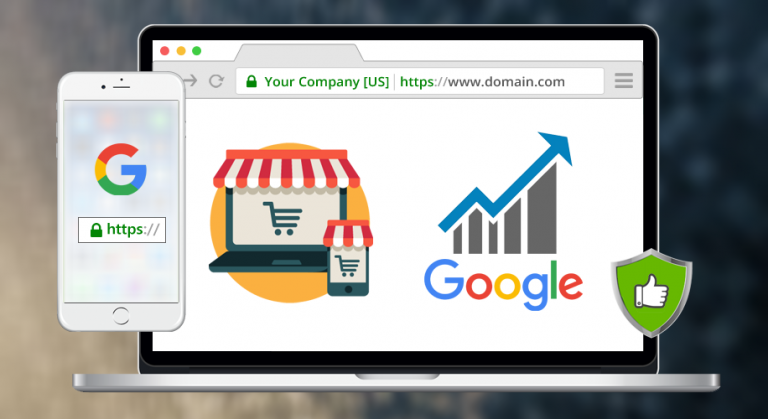Table of Contents
HTTP and HTTPS. A tiny ‘S’ seems to be the only difference between the two technologies. However, The difference between HTTP and HTTPS protocol that you must take note of.
In fact, if your website is running on HTTP (unsecured) protocol, then it is necessary to protect online communication from your web server to user’s web browser and vice versa, which can be done by enabling HTTPS on your site for long-term benefits.
Before knowing reasons, let’s see what HTTPS is? and why it is so important? and what difference it makes from HTTP?
HTTPS is known as a secured version of HTTP. It is made secure using an SSL certificate. An SSL (Secure Sockets Layer), currently known as Transport Layer Security (TLS) is a security protocol that encrypts data that is exchanged between two client-server systems.
In other words, it creates a safety tunnel for sensitive data to go from one point to another without being intercepted by unauthorized personnel (usually hackers).
There is no much difference between TLS and SSL. TLS is a slightly advanced version of SSL that uses a longer encryption protocol with ECC, RSA or DSA encryption.
SSL/TLS is important for banking, insurance, eCommerce or any business that collects sensitive information online such as credit card payment details, Account logins, Form Inputs and so on.
HTTPS encryption ensures that your business gets all the network security it needs to stay secure in a web environment where hackers are getting better with every single day.
Why is HTTPS important?
For reasons aplenty. To begin with, Google has started flagging off websites without HTTPS as ‘Not Secure’. Insecure websites will suffer in terms of SEO ranking as well as Customers’ Lack of Trust.
In this post, We are listing out few reasons why enabling HTTPS for your website is important:
#1. Better Search Engine Ranking
The biggest of all benefits that HTTPS will bring to businesses is improving search engine ranking. The world’s most preferred search engine Google has announced to give a ranking boost to secure HTTPS-enabled websites. You can find stunning growth in HTTPS adoption rate.
#2. Avoid “Not Secure” warning label in Chrome browser
Until January 2017, Google was showing HTTP websites with a neutral indicator. But, January onward, with the release of the Chrome 56 version, things took a swift turn. All HTTP websites were highlighted as “Not secure”. Recently, Google has been started to show “Not Secure” label in the address bar with their latest released update “Chrome version 62” in October 2017 when a user enters data in login form of HTTP site. The “Not Secure” label also be displayed in Incognito mode of chrome browser.
#3. Boosts Customer Trust
In the eCommerce business or in any other financial company, trust plays a key role in long-term relationships. Customers buy products from online stores that follow secured check out process enabled on HTTPS protocol and delivers quality products. HTTPS is a great way to show that your website and the information shared with it secure. Also, Certificate Authority gives trust seals along with the SSL certificate, which can be displayed on checkout pages to boost customer trust.
Advanced SSL certificates like EV SSL activates highly visible trust indicators on the browser address bar such as Green Padlock icon, https://, a green address bar, verified company name, and country in green font. Customers can ensure that website is verified by a trusted third-party CA and site is safe for submitting personal and financial information.
While this might trivial for normal circumstances, it gains prominence in sensitive online transactions like online banking, credit card payments, and so on. Users need to be sure that their details would remain safe and far from man-in-the-middle attack (MITM). Enabling HTTPS for your website helps to secure your user information.
#4. Google AMP Works Only On HTTPS
AMP stands for Accelerated Mobile Pages. AMP load web pages on mobile devices instantly. They do not have loading times which gives a superior user experience. AMP works by inserting a code in the website’s backend.
While AMP delivers many benefits like faster page loading, it also has some conditions for smooth functioning. One among them is that the website must be HTTPS. AMP will not work on HTTP websites. Hence, there is a need to enable HTTPS for your website right away. Without HTTPS the faster page loading speed of HTTPS cannot be obtained.
#5. HTTPS Brings Accurate Referrer Data
If traffic comes to an unsecured (HTTP) site from an HTTPS page, then it is rendered as direct traffic. This will deny you the benefit of referrer data. Losing referrer data will have long-term SEO shortcomings. For instance, your pages may not reach the first position, instead might end up somewhere in the second or third position.
The underlying reason is that Google wants all websites to move to a secure web environment. To discourage website owners from sticking on to HTTP format, they have set up the Google Analytics to give preference to HTTPS website. When traffic comes to HTTPS site from HTTP/HTTPS site then Referral information is preserved. Thus, HTTPS site brings accurate referrer data.
#6. Page Loading Speed
The page loading speed for HTTPS websites is significantly higher than HTTP websites. A study conducted by httpvshttps.com that HTTP websites load 334% slower than HTTPS websites. Page loading speed being also considered as a search engine ranking signal, sticking to HTTP is not something you want to have for the long-term.
Which brings us to the next reason to upgrade to HTTPS.
CONCLUSION
Migrating to HTTPS is inevitable. It is like wondering whether you should have your website mobile-friendly in the age of smartphones. Sooner or later security will become extremely important for search engine ranking as well as for earning customer trust.
Enable HTTPS as soon as you can. It will help you reap several benefits including higher search engine ranking, customer trust, AMP for your mobile pages and also referrer data in Google analytics. Do not forget that Google will tag your website as not secure which can question your site’s integrity. In an extremely competitive environment, this is something that you really don’t want undergo.
=========================================================
Thanks for reading this post! Don’t just read and leave,
but please like, follow me, and share to others too!!..
=========================================================
This article was originally published in 26 April 2018. It was most recently updated in November 23, 2023 by Wise























